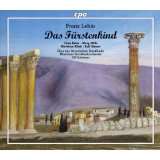|
Back
07/04/2013
Franz Lehár: Das Fürstenkind
Chen Reiss (Photini), Mary Mills (Mary-Ann), Matthias Klink (Hadschi Stavros), Ralf Simon (Bill Harris), Theresa Holzhauser (Gwendolyne), Jörg Schörner (Thomas Barley), Marko Cilic (Naukleros Perikles), Mauro Peter (Koltzida), Christian Eberl (Christodulos), Henry Raudales (Violin), Münchner Rundfunkorchester und Chor des Bayerischen Rundfunks, Ulf Schirmer (Conductor)
Recorded live at the Prinzregententheater, Munich (November 28, 2010) – 123’22
cpo # 777 680-2 – Booklet in German and English

   
Born of Czech/Hungarian ancestry, Franz Lehár’s 1902 waltz, Gold und Silber, gave him the impetus to reengage the world of Viennese operetta after his first unsuccessful attempt in this genre with the opera Kukuska in 1896. Singlehandedly, Lehár is best known for his work Die lustige Witwe (1905), infused with bubbly froth, sweeping melodies and spicy sassiness. Favorable reception, however, would not return to the composer until the arrival of his Paris-laden work, Der Graf von Luxemburg in 1909. Wedged between the two aforementioned works, Franz Lehár went on to create Das Fürstenkind (translated: The Prince’s Child) which actually premiered on November 7, 1909, a bit over a month before Luxemburg’s debut.
Lehár was bowled over by Victor Léon’s digested libretto based on Edmond d’About’s novella, Le Roi des montagnes (1856). The absurd story involves Hadschi Stavros, leading a double life as Prince and part time bandit, reminiscent of a modernized version of Auber’s Fra Diavolo, complete with Anglicized names (i.e. Mary-Ann, Bill Harris, Gwendolyne, Thomas Barley) while Lehár’s translation contains a sparkly military march (“Räubermarsch”), patches of memorable ensembles and an overgenerous dosage of dialogue.
Well known for her film voice, Chen Reiss has charming vocalization with a bite as she sings the soprano role of Photini, Princess of Parnes. Her duet (“Papa, ich bin verliebt”) alongside Ralf Simon’s Bill Harris is a sweet amorous discourse that ends with a sweeping trademark run similar to “Vilja” from Die lustige Witwe. Early in Act I Lehár’s well-defined leitmotif is established through a feisty, affected declamation by Matthias Klink in the “Palikar Song”, but his verve is not without its underlay of tenor unsettledness and bit of cracked voice.
Listening to Das Fürstenkind brings to mind compositions penned by contemporaries of the time: the “Finale II” ending Act I begins with resemblance to Gabriel Pierné’s Cydalise et le chčvre-pied while later in the number, we see veins of Hungarian zest suggesting Emmerich Kálmán’s Die Csárdásfürstin. American cinematic sweeps underline nicely in the score and even Leo Fall’s Die Dollarprinzessin (1907), pops up with some conservative brassiness. The “Resignation Intermezzo” is a radiant musical revue bridging Acts I and II.
Ulf Shirmer and the Münchner Rundfunkorchester express Das Fürstenkind with beautiful lyricism. Though the synopsis is poorly written (done within track descriptions) and a bit confusing, perhaps it's best to simply sit back and enjoy the music itself.
Christie Grimstad
|